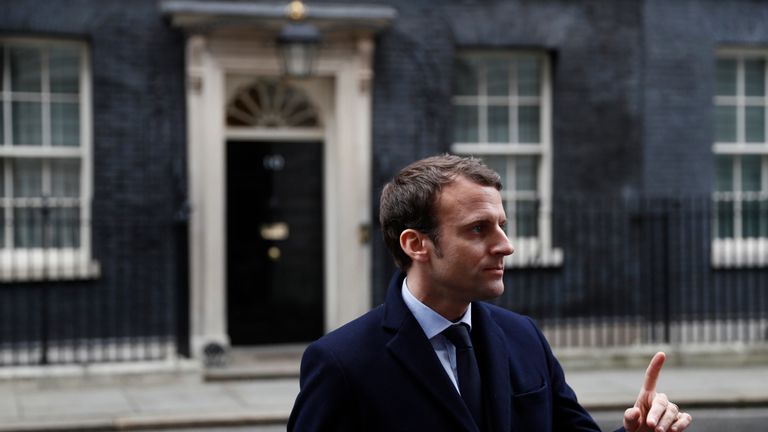French election: What the Emmanuel Macron presidency will mean for Brexit
Emmanuel Macron should be easier to deal with than Marine Le Pen would have been, writes Sky's political editor Faisal Islam.
Tuesday 9 May 2017 13:48, UK
The new French president could transform the fate of the European Union and with it the Brexit talks.
A party of the centre and internationalist centre-left that is barely a year old has seized the Elysee, defeating 's far right Front National in the election run-off with 66% of the vote.
As some European diplomats acknowledge, had the vote gone the way of Madame Le Pen then the very existence of the European Union, without one of its anchors, would have been in doubt.
The notion that Brexit could cause the collapse of the European Union is now off the table.
British Prime Minister Theresa May made a point of meeting , 39, in Downing Street during his London rally in March. The talks were constructive.
Though, as the EU flag was waved by the crowd ahead of his Louvre victory speech, a pop star sang a cover of Sting with the lyrics, "I'm an alien, I'm an Englishman in Paris". He then arrived to the EU theme tune, "Ode to Joy".
In January, Mr Macron criticised the Prime Minister's dash to the Trump White House, saying Brexit Britain was becoming a "vassal state" of the US.
His campaign material also described Brexit as a "crime", and he has vowed to take UK jobs in research and banking to France.
His number one priority will be to defend and entrench the single market and the eurozone.
In a recent magazine interview, Mr Macron said that "if Britain wants to trade with Europe it has to choose a model such as the Swiss, Norwegian or Canadian... It's the British who will lose the most... Europe is what has enabled unprecedented peace, security, freedom and prosperity on our continent. The British are making a serious mistake over the long-term".
He went on to criticise the Foreign Secretary.
"Boris Johnson enjoys giving flamboyant speeches but has no strategic vision," he said.
"The turmoil he created the day after Brexit proves it... on the geopolitical level, as well as on the financial, realignment and submission to the US. What is going to happen is not 'taking back control', it's servitude."
So far, so concerning for the Brexit negotiation, which will begin in earnest after the General Election in June and require Britain to commit to a hefty multibillion settlement of liabilities before trade talks start.
Number 10 did not interfere with an ongoing election, but the figure they want to be dealing with is Mr Macron, not Ms Le Pen. The making of a Brexit deal will be easier with a self-confident European Union than with one that is disintegrating.
Mr Macron is a technocratic details man, an unashamed expert economist, reinvented as a champion of open internationalism.
His task as economy minister under Francois Hollande was to reform the French economy, to inject German-style dynamism.
He identified the key problem in the French economy as a lack of private investment.
He designed the Responsibility Pact of deregulation measures, and advocated reducing public spending from 57% of GDP down to 50% by 2020.
He wanted to transform the role of unions in France, by granting them German-style board rights but reducing their flexibility in blocking corporate change.
He has studied Tony Blair's transformation of the British Left and acknowledged that the French Left has had "no big ideological change".
Fundamentally he believes that if Europe's social model does not modernise then "de facto you accept to kill it, because you won't be able to modernise it in five or 10 years' time".
He has compared the sluggishness of the French industrial giants such as Peugeot with the German auto industry.
He is critical of the role of Brussels during the eurozone crisis, acknowledging a lack of democracy in the specifying of policies for eurozone crisis nations by an "interfering" European Commission.
Fundamentally he would be a president without a parliamentary base, as things stand, though polls for next month's parliamentary elections have started to move towards his En Marche! party too.
And yet he has radical instincts.
He will be detained with reforms of the French economy, and also further reforms to try to take the sting out of the eurozone crisis.
That will be his overwhelming priority - trying to create structures to iron out the recent problems of the eurozone.
Brexit negotiations will have to slot into that. He will not alter the currently agreed European Commission negotiating mandate.
Brexit, for him, is an opportunity to seize market share for France.
But it is worth considering that his top economic adviser, Jean Pisani-Ferry, has floated a compromise agreement with the UK which he calls a "Continental Partnership", which could mean large-scale single market access with limits on free movement.
More intriguingly, could the emergence of a young centrist candidate encourage a British copycat?
The political system in the UK makes it much more difficult. However, there is already a variety of political power brokers anticipating a realignment of liberal left parties after the election.
Mr Macron's success will only encourage them, as will Matteo Renzi's comeback in Italy.
Germany's election is now a straight fight between two Europhiles, Martin Schulz and Chancellor Angela Merkel.
On top of elections in the Netherlands and in Austria, the European electorate's response to Brexit and Trump has been to reaffirm the European Union.
It was never likely to back down on its negotiating stance regarding bills, citizens rights and the sequencing of talks.
It's even less likely now.








